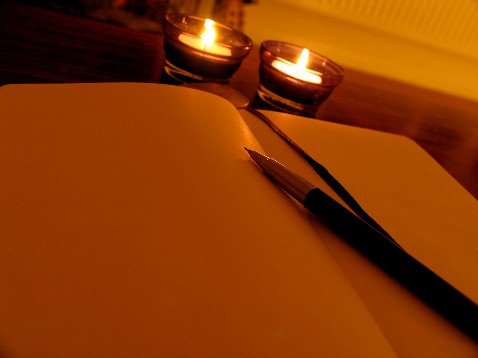Searching
/When I first became acquainted with Josh's writing at his blog Jack at Random, I became immediately enchanted with the beauty and honesty in which he articulated his deep heartbreak. I grieved with him for his daughter Margot, who died March 24, 2011, after his wife fell and suffered a full placental abruption. In a blink, he lost his second daughter, almost lost his wife. The raw love, jagged and stunning, expressed in each sentence resonated so deeply with me. I found myself crying before I knew I was grieving for another. We are just so honored that Josh has agreed to join us here, as a regular contributor, sharing his journey as father and husband with us. Please help me welcome Josh to this space. --Angie
She was there for a time, in my arms, her cool cheek against my wet cheek, her pale forehead touching my forehead, her limp body held tightly against my chest.
Then she was off, in the care of impassive strangers, having open heart surgery to remove her valves for donation, taking little joyrides around Los Angeles between the hospital and coroner and crematorium.
She arrived back to me in a little white canister, her name neatly typed in courier font on a small strip of paper: Margot June Jackson. Number 4-2389. Cremated 03/31/2011.
And then she was in my sock drawer. She was partly there to protect us all from the possible awkwardness of others seeing her, and partly to protect us from the harsh reality that our daughter was suddenly reduced to ashes. For those few days before the memorial, I saw nothing in my house but the canister. I’d walk past mourning grandparents, step over my two year olds toys, eat dinner around a table and it was all just a blur. My daughter was in my house, in a canister, and I saw nothing else.
And then we took her into the woods and poured her into the river.
And then I couldn’t find her.
For if we find the deceased in our collective memories, where they still live on, cemented in photos and stories, how can we possibly find our babies? When memories barely exist, a few hours here, a few days there, how can they remain present? And when there are so few collective stories, passed on by those who knew and loved and touched the deceased, how will anyone else remember or find our babies? 
Heaven would be nice, if I believed in such a possibility. It’s a comforting thought to think I could meet her one day again. Reincarnation would be nice too, the thought that she might resurface somewhere in the world, another chance at the tricky elusiveness of life. But instead, my mind only allows what I can know without doubt. She died. We had her cremated. And we placed her ashes into the river.
Even still, I search and search, looking around every river bend, under every mountain rock and desert plant, on the metro and freeway, in the few pictures we have, in my fleeting memories, in my letters to her. But she is rarely there, always just out of my grasp, always still dead.
And yet.
As the months trudge on without her, as my search turns up empty, as the solitary moments I had with her slowly scatter to the far reaches of my memory, I’m starting to notice that as my grief evolves, I can find her from time to time.
Sometimes I find her in this new life that has suddenly emerged, one filled with desperate sorrow over her loss and sadness over a life that has become different than I always imagined. And in carrying these losses from day to day, I carry my daughter along with them.
Sometimes I find her in the water, in the river where we said goodbye, in the ocean where she eventually ended up.
Sometimes I find her in this new company I’m now apart of, the society of the suffering. We have joined those who know and experience loss, whether close to home or far away. I find intimacy with them, with you, and in those moments, I feel close to her.
Sometimes I find her in new friendships, which have only formed because of her absence.
Sometimes I find her in my broken heart, the fragmented pieces that drip with sadness but also hold her very existence. Since I can never have her back, what’s better - a whole heart without her ever existing, or a broken heart with her dead? No matter how short her life, no matter how little time we had together, she is my second child. And I choose her.
Where do you find your kids? Do you find them in different places as your grief has evolved over the months and years? Do you find them at the grave, in your home or the spot where the ashes were scattered? Do you find your baby in a symbol?



